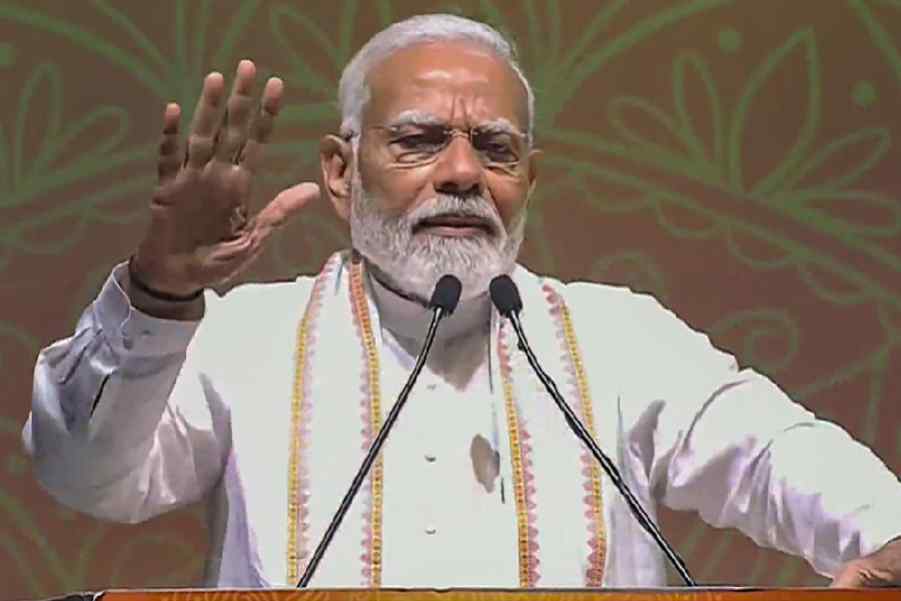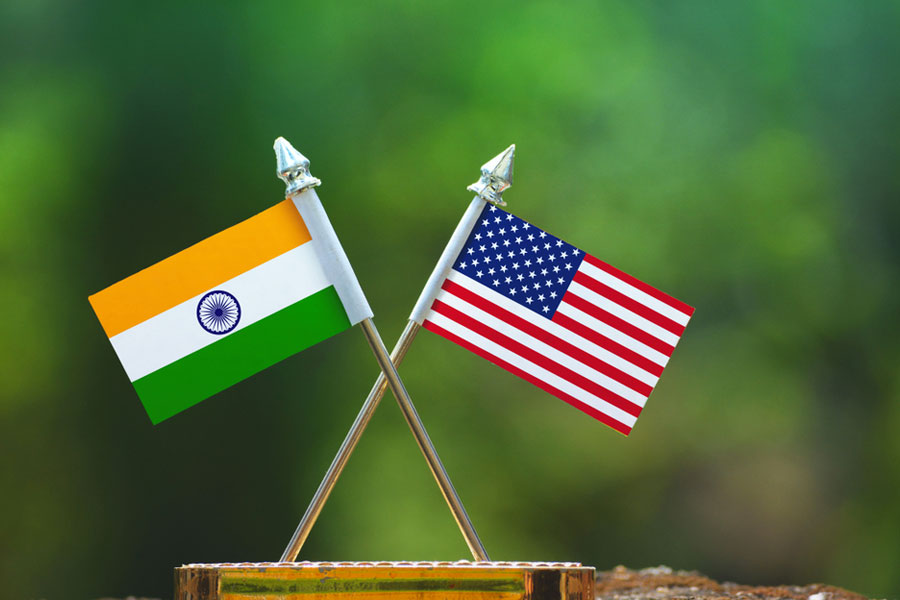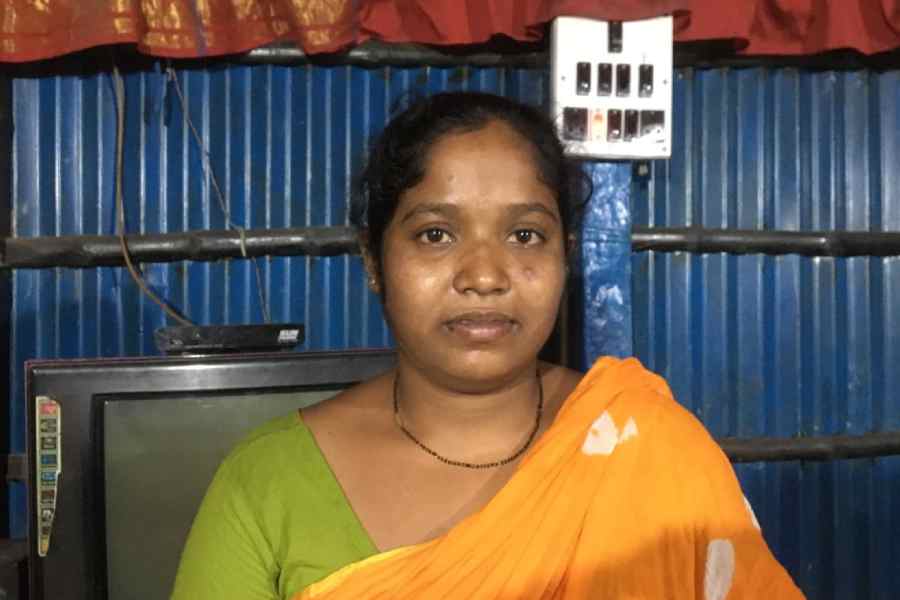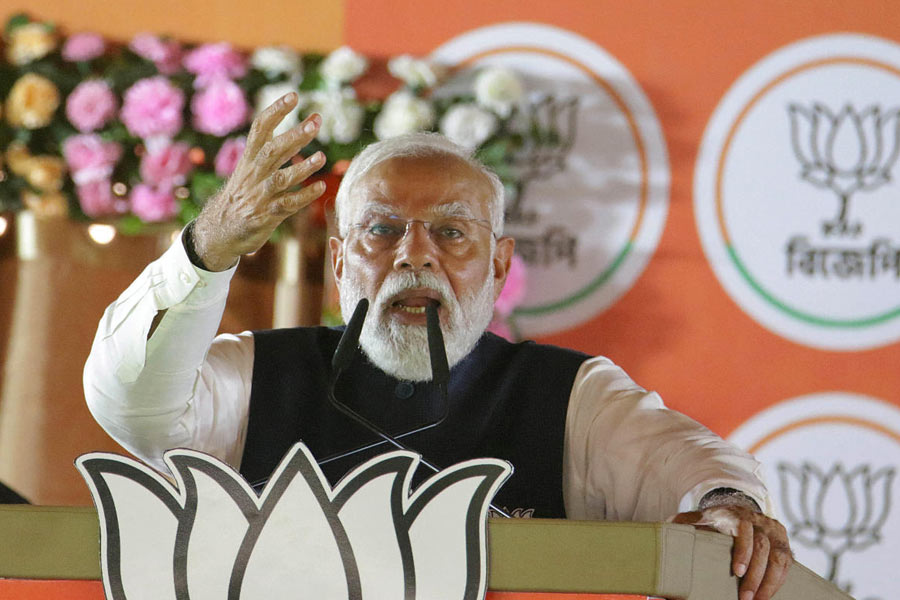 |
| Sugata Bose with Suman Ghosh at An Author’s Afternoon in Taj Bengal on August 2. Pictures: Rashbehari Das |
Grand-nephew of Subhas Chandra Bose, Harvard historian, author, Trinamul Congress MP... Sugata Bose is well-known in his many avatars. At An Author’s Afternoon, presented by Shree Cement at Taj Bengal, along with Prabha Khaitan Foundation and Jaipur-based literary consultancy Siyahi, economist-filmmaker Suman Ghosh added two more — singer and documentary filmmaker — while the audience discovered yet another, that of a jolly good raconteur! Excerpts.
Suman Ghosh: Prof Sugata Bose doesn’t need any introduction. But there is an introduction that many people don’t know — he’s an excellent singer and also a filmmaker. He had made a documentary almost 20 years back, was it?
Sugata Bose: Which one are you thinking of? There are three...
Suman: About Hindutva…?
Sugata: Oh yes, that was filmed during the general elections of 1991. It was called Mandir Masjid Mandal and Marx. Before that I made one called Rebels Against the Raj, it was shown in the United States in 1986. And subsequently I made another one, called Netaji and India’s Freedom (1993). But as you would know, filmmaking is a very capital-intensive exercise. You can write books if you just deploy intellectual labour, whether you get a grant or not! But for films, it’s quite different. I’d like to go back to making a documentary at some point.
 |
| Amid pre-session laughter and chatter, Bose signs a copy of His Majesty’s Opponent for Soumitra Chatterjee, who later told t2 he really enjoyed his first An Author’s Afternoon. |
Suman: You come from one of the most illustrious families of Bengal, not only of Subhas Bose but Sarat Bose and your parents… how did that influence you while growing up?
Sugata: Well, my father, Dr Sisir Kumar Bose, always told me that the fact that I belong to the family of Netaji Subhas Chandra Bose is merely an accident of birth. And therefore, I should not claim any special privilege. He would always tell me two anecdotes. One, Netaji used to say that his family and his country were coterminous. So everyone in India belonged to Netaji’s family.
The other anecdote was more personal. When my father was released from prison in Punjab in September 1945, he was taken to Lahore and in a procession he heard the slogan, ‘Bose khaandaan zindabad/Long live the Bose family.’ Then he came to Calcutta. His father, my grandfather, Sarat Chandra Bose, told him, ‘Don’t let all these slogans turn your head, they are nothing but Subhas’s reflected glory. Your medical studies have been interrupted... become a doctor and then if you get opportunities for public service, by all means, enter public life.’ This advice stayed with me.
Suman: You had told me about the influence of Amartya Sen at Cambridge. How did an economist enter your scholarly sphere?
Sugata: I was working in the field of economic history. The main focus of my doctoral research was the 1930s Depression, a worldwide economic crisis and how it affected the agrarian economy and society of colonial South Asia, particularly eastern India. When I was a Phd student I had been invited to give a seminar at Oxford University and Amartyada, who was Drummond Professor of Political Economy at that time at Oxford, had heard about my paper and wrote to me and called me. Because he had been working on his book Poverty and Famines and in it, of course, he had a chapter on the Bengal famine. I had been somewhat critical of his analysis in that chapter…. So we started discussing.
He came once to Cambridge and that was my first instance — and since then there have been innumerable instances — of my finding out that Amartyada is always a bit late!
The best thing about Amartyada was how well he would take criticism from an over-enthusiastic graduate student! He would respond with tremendous grace to my criticisms.
 |
| Krishna Bose (left) listened to son Sugata from the front row. “It was a stimulating chat. The questions were difficult but I believe Sugata dealt with them well. It is always a pleasure listening to interesting discussions because these days we don’t get to hear anything other than violence everywhere,” said Krishna Bose, seen here with Nayantara Palchoudhuri |
Suman: Currently we are in a very interesting phase as far as world politics is concerned. If you think of one of the most influential essays by Francis Fukuyama, The End of History?, which he wrote just after the Tiananmen Square protest and the collapse of the Berlin Wall… there he basically heralded the triumph of market liberalism and democracy. But particularly in the last four-five years, it seems that there’s a democratic recession — the failure of the Arab Spring and democracies tumbling in Nicaragua, Thailand, Bangladesh… what is your take?
Sugata: Well, Fukuyama’s essay on the “end of history” was really an exercise in triumphalism. He was basically celebrating the end of the Cold War. Not just that, but the victory of the United States, the collapse of the Communist system, the break-up of the Soviet Union. Clearly the years 1989 to 1991 constituted an important turning point in global history. But it was more the beginning of a new phase of the history of global interconnections than the “end” of history.
Fukuyama’s thesis fell through the trapdoor of history very quickly. He tried to revive it a little bit when there was apparently this surge of democracy in the Arab world, known as the Arab Spring, but what became very clear is that when there is a legacy of entrenched dictatorship, or military rule or institutional imbalances, just certain movements for democracy or the holding of one round of elections cannot bring about the structural changes that are necessary. So that celebratory moment of the democracy spring in the Middle East passed very quickly too. So there are instances where you might say this democratic recession is characterised by the dominance of non-elected institutions of state.
 |
| Harsh Neotia gets his book signedby Bose |
Suman: Not only non-elected. If you think of the Orange Revolution in Ukraine, what happened was that in 2004 they were democratically elected but soon they become power-hungry political elites and that is the tendency which we are observing in a lot of places — Egypt, Ukraine…
Sugata: In fact, what I worry about even more is, these are instances where it’s more or less black and white, you can see that this is dictatorship rather than democracy, but there are many other instances where there is formal democracy, elections are being held, but as I pointed out in my first speech in Parliament in June, we tend to confuse majoritarianism with democracy and uniformity with unity. This is an extremely worrying trend, we saw it even in our region, in Sri Lanka. I think we are beginning to see it in our country. The election we witnessed in April-May was an extraordinarily money-driven election.
Suman: Another trend in the world now... is a rise of the right wing, if you think about Holland, France, in the UK... even the way the BJP came to power here, which I would call a right-wing party. Do you see a common trend?
Sugata: The one commonality that I see, if you talk about a right-wing tendency, we have had right-wing movements before. One needs only to go back to the 1980s to think about the Reagan and Thatcher “revolutions” in the US and the UK….
Suman: That was economic right wing…
Sugata: That’s right. What I’m trying to say is that you’re beginning to see a convergence of right-wing economic philosophy and a kind of right-wing politics based on either religious or ethnic or racial exclusivity. That is exactly what you are seeing in all of these local elections that have taken place in France, Holland or the United Kingdom. This convergence wasn’t there during the right-wing surge in terms of economic philosophy, economic policy of the 1990s.
Suman: So this is more disturbing…?
Sugata: There is a peculiar sort of coming together of two rather disparate right-wing tendencies and it is worrying because those who are moneyed, the billionaires, actually support the right-wing philosophy based on race, religion or ethnicity.
 |
| Agnimitra Paul sneaks in a selfie with Soumitra Chatterjee as guests enjoyed tea and snacks after the power-packed session |
Suman: Your book on Subhas Bose, His Majesty’s Opponent, has garnered a lot of praise. But one of the criticisms was his interactions with so-called fascist powers and you justifying it… would you take the stance of a consequentialist, ‘the end justifies the means’ philosophy?
Sugata: First of all, I was not justifying Subhas Bose’s choices during the Second World War, I was trying to explain why he made those choices. And I think it is a mistake to think that he was making these decisions simply on the basis of either the end justifies the means — even though he held that the end of India’s freedom and the freedom of all colonially oppressed people was something worth fighting for — nor did he simply act upon the principle that is oft repeated, my enemy’s enemy is my friend.
What I tried to show was, here was a man who had been in India’s anti-colonial movement for two decades under the leadership of Mahatma Gandhi and Deshbandhu Chittaranjan Das and he saw that even though the civilian masses had responded to Gandhi’s call, the soldiers who had fought for the British empire had remained insulated from the wider currents of civilian discontent.... Therefore he felt he had to take advantage of an international war crisis. And in order to change the loyalties of the Indian soldiers to the King Emperor and replace that with a new loyalty to the cause of the Indian nation, there was only one way in which he could have access to these Indian soldiers and this was to go to the territories where they were being held by the enemies of Britain.
At the time that he escaped, which was January 1941, they were being held by Germany and Italy. The Soviet Union had a pact with Germany and that is why he was able to travel through the Soviet Union. He saw that during the Second World War, the situation had changed, and he had to create for himself a list of priorities and he felt that the freedom of India and the freedom of the colonially oppressed people must take precedence over the terrible nature of Nazism in Europe.
Suman: A similar instance happened in Tagore’s life with his interaction with Mussolini, which of course he later regretted in his writings.
Sugata: Documents show that Bose also sharply criticised the German invasion of Soviet Union, sitting in Germany. And he did so in writing. He wrote letters to the German foreign minister saying that the advance of the German troops towards India will be regarded as the advance of an enemy, not of a friend. So I think he showed great courage, nobody else did so.
Suman: When you became the mentor of Presidency University, you had said that by 2017 Presidency will be one of the acclaimed universities comparable to the rest of the world. Now it is 2014... and you’ve had full state support, so where do you think the Presidency venture is headed?
Sugata: Well, that was our goal. You have to have some degree of exhortation… (laughs). I think there has been a precipitous decline in the standards of Presidency College in the 30 years preceding 2011, when we tried to once again rejuvenate the institution. Compared to where we found Presidency, I think in a very short period of time, there has been a dramatic improvement.
The biggest success has been in recruiting a very fine faculty. More than 180 new professors, associate professors and assistant professors have joined and I think we have had many major successes in the science departments, such as biological sciences and physics. What is remarkable is that we were able to get some of the leaders in the various disciplines to come and serve on our selection committees and all of these appointments were based on academic merit alone....
Challenges remain. You say we had state support. True, but the fact is that the dearness allowance (DA) given to faculty members in central universities and institutes is much higher than what we can offer in Bengal. I have tried to make up the gap by asking the chief minister to provide special funds for such a professional development. She came forth and gave us extra amounts... but the central government kept increasing their dearness allowance rate, which now stands at a 100 per cent. In Bengal it is only 58 per cent and therefore there always will be some danger of poaching by private universities, which offer higher salaries, but also central institutes and universities saying that your total remuneration will be higher if you join us.
And we have a shortage of faculty in our higher education system. It should be tackled by the Centre. Eighty per cent of our university students go to state universities, 20 per cent to central universities, yet 80 per cent of central funds go to central universities and only 20 per cent to state universities. It should be part of the planning of our call for greater federalism in our country.
The Centre is just unfair to promising state universities and even recently in my budget speech I pointed out to the current finance minister that rather than spending money on building five new IIMs and five new IITs and one nominal humanities centre in Madhya Pradesh, why don’t you provide that same amount to 10 of the most promising state and central universities? That is what China did and seven of their universities have broken into the ranks of the 100 top universities in the world.
Arindam Sil (actor-filmmaker): You have two selves — academician and politician. But in this country I feel knowledge contradicts more than complements politics....
Sugata: Why two selves, we have many different kinds of identities.... But in Bengal there was a time when we broke down these boundaries of specialisation. We actually felt that to be educated we had to traverse many different fields of knowledge. My grandfather, Charu Chandra Chaudhuri, who was a lawyer, used to translate poems of Tagore... was a wonderful esraj player and sang. I have not had any formal training in music, I have learnt all of my music from my maternal grandfather and from my mother, who was a sitar player, a singer and was an academic all her life. She taught for 40 years and after that she too entered parliamentary politics and had three terms in the Lok Sabha and actually wrote a book titled An Outsider in Politics.
I have to say that I was reluctant [to join parliamentary politics] and resisted this for a long time but then I felt this was a critical moment in our political history. I could see that the Congress was collapsing and would suffer a catastrophic defeat. I did not want to see the kind of government that has been formed. I felt that the best chance we had of an alternative coalition was if regional parties, including the one in Bengal, did well and could actually play a role in the formation of a new government. That did not come to pass but in some ways our responsibilities have grown — we have to provide a principled voice in Opposition, which I am certainly trying to do.
Jash Sen (author): His Majesty’s Opponent is, of course, wonderfully researched but it is also very warmly written. It is not dry and not very many biographies achieve that. It doesn’t read like an academic book at all. It is very engaging. How did you arrive at that fine balance?
Sugata: I paid special attention to this. This book is based on a lot of research in many archives, over I don’t know how many years! I wanted to write in an attractive style for a wide readership, not just for historians or academics but for anyone interested in books or with an intellectual curiosity about either South Asian history or global history in the 20th century.
I have always believed that the historical essay is an art form. There is a very close relationship between history and literature, which is often lost in the formal academy. I know that there are some historians who write, to use your term, “dry”. Our textbooks are dry, which is why school children don’t get as interested in history as they should.
History and literature are inextricably intertwined. Even before this book, I felt a great sense of liberation when I was writing my book A Hundred Horizons and I have a wonderful editor Joyce Seltzer, who is a celebrated New York-based editor of Harvard University Press. She encouraged me to write attractively and I also remember what Eric Stokes, my PhD supervisor, told me once, ‘Sugata, you write well. So continue to write attractively and don’t be too constrained by what are mistakenly seen as academic conventions.’ That is what has led me to write a book of this kind, which I hope people will enjoy reading.
Text: Samhita Chakraborty and Malancha Dasgupta










